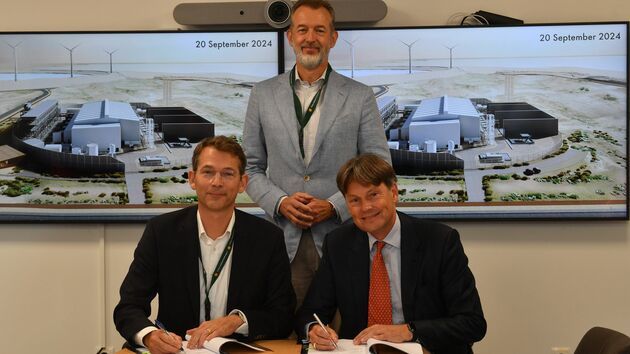Shell is constructing the first major plant for renewable hydrogen in Europe with a capacity of 200 MW

L-R: Maarten Abbenhuis, COO, TenneT, Boudewijn Siemons, CEO, Port of Rotterdam Authority and Frans Everts, President-Director, Shell Netherlands. Photo: Shell, Ernst Bode.
Shell and TenneT have signed a connection and transport agreement to connect the first large-scale hydrogen plant to the high-voltage grid. Shell’s Holland Hydrogen 1 will be a 200-megawatt (MW) electrolyser on the Maasvlakte.
In the coming years, the electrolyser will initially be connected to the Maasvlakte 380 kV high-voltage substation via a temporary connection. Once the Amaliahaven 380 kV high-voltage substation is taken into commission, Shell will get a permanent and complete connection to the high-voltage grid. This enables TenneT to meet Shell’s wish to realise a connection promptly.
Shell is constructing the first major plant for renewable hydrogen in Europe, with a capacity of 200 MW. The plant will arise behind the dunes on the Dutch coast, on Maasvlakte 2. Holland Hydrogen 1 will help the Shell Energy and Chemicals Park Rotterdam (Pernis) among others, to become more sustainable. A special hydrogen pipeline connects the hydrogen plant to the port of Rotterdam.
TenneT does not have enough space on the existing high-voltage substations to connect the hydrogen plant. A new 380 kV high-voltage substation is therefore being constructed in the Amaliahaven at Maasvlakte 2. The substation is expected to be completed by the end of 2026. Shell and TenneT have therefore devised a temporary solution, enabling Shell to have a temporary and limited connection to the Maasvlakte 380 kV high-voltage substation. Once the Amaliahaven high-voltage substation is taken into commission, Shell will be completely and permanently connected to the high-voltage grid.
On Friday, 20 September, Frans Everts from Shell and Maarten Abbenhuis of TenneT signed the connection and transport agreement under the watchful eye of Boudewijn Siemons from port of Rotterdam.
Maarten Abbenhuis, COO of TenneT, said: "Seeing as space has become available on this temporary connection, we can already facilitate Shell’s hydrogen plant. We have been able to find this solution due to the good collaboration between Shell and port of Rotterdam. It’s a great example of a smart and unorthodox solution enabling parties to connect, despite the scarce space on the grid."
Frans Everts, CEO of Shell Netherland: "Green hydrogen, electrification and capturing and storing CO2 will enable us to make Dutch industry more sustainable. We will be able to make raw materials and products we all use every day in a clean way. This collaboration with TenneT demonstrates once more that the energy transition is a team sport. Together, we can accelerate this necessary transition to cleaner energy."
Boudewijn Siemons, CEO of port of Rotterdam: "The strength of the industrial cluster in our port is that companies collaborate creatively and smartly, enabling the necessary steps in the energy transition and thus strengthening the cluster as a whole. This agreement between TenneT and Shell is an excellent example of that."
Subscribe to our newsletter & stay updated.